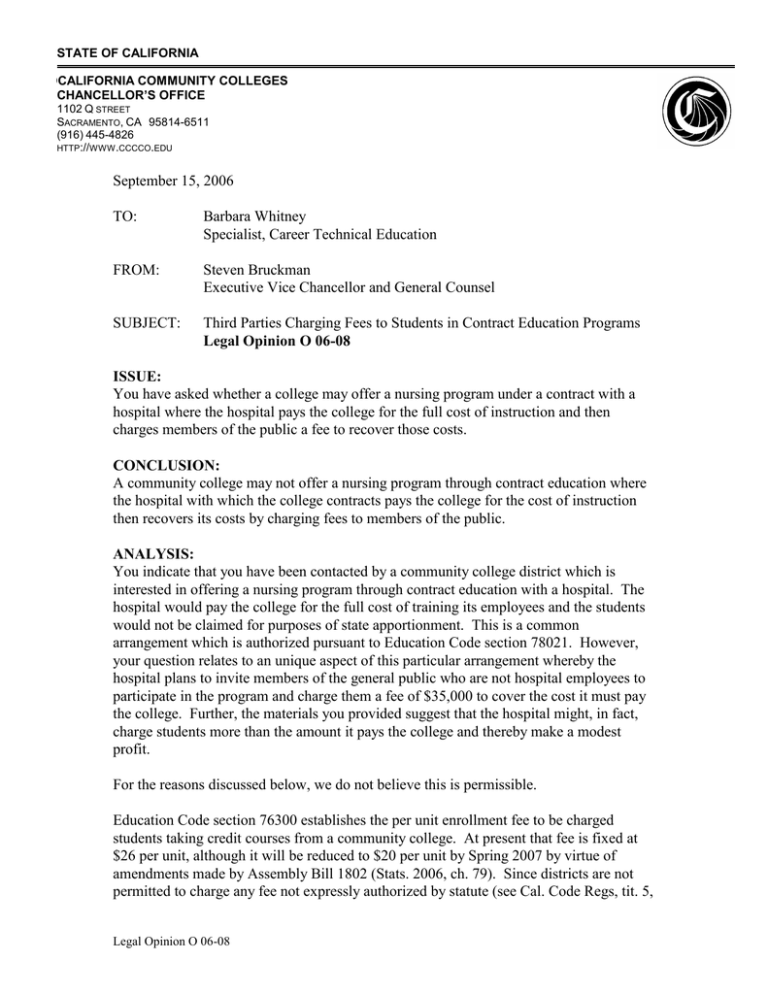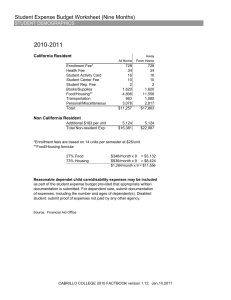September 15, 2006 TO: Barbara Whitney
advertisement

STATE OF CALIFORNIA CALIFOCALIFORNIA COMMUNITY COLLEGES CHANCELLOR’S OFFICE 1102 Q STREET SACRAMENTO, CA 95814-6511 (916) 445-4826 HTTP://WWW .CCCCO.EDU September 15, 2006 TO: Barbara Whitney Specialist, Career Technical Education FROM: Steven Bruckman Executive Vice Chancellor and General Counsel SUBJECT: Third Parties Charging Fees to Students in Contract Education Programs Legal Opinion O 06-08 ISSUE: You have asked whether a college may offer a nursing program under a contract with a hospital where the hospital pays the college for the full cost of instruction and then charges members of the public a fee to recover those costs. CONCLUSION: A community college may not offer a nursing program through contract education where the hospital with which the college contracts pays the college for the cost of instruction then recovers its costs by charging fees to members of the public. ANALYSIS: You indicate that you have been contacted by a community college district which is interested in offering a nursing program through contract education with a hospital. The hospital would pay the college for the full cost of training its employees and the students would not be claimed for purposes of state apportionment. This is a common arrangement which is authorized pursuant to Education Code section 78021. However, your question relates to an unique aspect of this particular arrangement whereby the hospital plans to invite members of the general public who are not hospital employees to participate in the program and charge them a fee of $35,000 to cover the cost it must pay the college. Further, the materials you provided suggest that the hospital might, in fact, charge students more than the amount it pays the college and thereby make a modest profit. For the reasons discussed below, we do not believe this is permissible. Education Code section 76300 establishes the per unit enrollment fee to be charged students taking credit courses from a community college. At present that fee is fixed at $26 per unit, although it will be reduced to $20 per unit by Spring 2007 by virtue of amendments made by Assembly Bill 1802 (Stats. 2006, ch. 79). Since districts are not permitted to charge any fee not expressly authorized by statute (see Cal. Code Regs, tit. 5, Legal Opinion O 06-08 Barbara Whitney 2 September 12, 2006 § 51012) a community college district may not charge any lower or higher fee for enrollment in a course. However, Education Code section 76300(e)(3) grants an exemption from the enrollment fee for: "Students enrolled in credit contract education courses pursuant to Section 78021, if the entire cost of the course, including administrative costs, is paid by the public or private agency, corporation, or association with which the district is contracting and if these students are not included in the calculation of the full-time equivalent students (FTES) of that district." To the extent that this exception applies, the requirement to charge the enrollment fee specified by section 76300 is eliminated. So, the question is whether the exemption provided by subdivision (e)(3) of section 76300 permits the entity with which a district contracts to charge members of the public for the cost of instruction they receive. The critical language of subdivision (e)(3) is that the full cost of the course "is paid by the public or private agency." In the situation you describe, the hospital is not really paying for the cost of instruction, it is merely acting as a middleman and passing on to the college money it collects from members of the public, with perhaps the possibility that the hospital might even make a bit of money on the transaction by charging the student somewhat more than it pays the college. We cannot imagine that the Legislature ever intended subdivision (e)(3) to permit such a practice. For one thing, when that provision was added to section 76300 in 1996 by Assembly Bill 3031 (Stats. 1996, ch. 63), the analyses of the bill prepared by various committees of the Legislature emphasized that the purpose of the bill was to eliminate "a duplicative and costly requirement for business clients of community colleges." (Analysis prepared for the Assembly Committee on Higher Education, April 9, 1996.) In this case, the hospital is not incurring any cost for passing through money it collects from students and may even make a profit. Moreover, were we to sanction this practice, it would permit colleges to do by indirection what they cannot do directly. A college wishing to circumvent the enrollment fee statute would only need to find some outside entity willing to serve as a "front" and have that entity charge fees of any magnitude and pass them on to the college. If, as contemplated here, the outside entity can even make a profit on such a transaction, the incentives to construct such sham arrangements would be considerable. We do not intend to suggest that the district which asked about the arrangement you described proposed this idea to the hospital in a deliberate attempt to circumvent the law, but potential for that type of abuse certainly exists. Another problem with the proposed practice is that it blurs the lines between "open" courses and those which are not. On the one hand, the district indicates that the class will Legal Opinion O 06-08 Barbara Whitney 3 September 12, 2006 not be open to the general public and, as a result, will not be claimed for purposes of state apportionment. On the other hand, they ask whether members of the general public who are willing to pay $35,000 to the hospital may enroll in the course. IN effect, the course is "open" but only to those who are willing and able to pay for the cost of instruction. There is a name for such an arrangement—it is called a community service class and is authorized pursuant to Education Code section 78300. However, as we previously explained in Legal Opinion O 91-14, "a credit course may not be offered for a fee through community services, regardless of whether or not the course is claimed for purposes of state apportionment."1 Finally, we must keep in mind the overriding public policy embodied by the enrollment fee statute. Until the early 1980's, community college education was entirely free. The enactment of the first enrollment fee statute in 1984 (see former Ed. Code, § 72252, added by Stats. 1983-4, 2d Ex.Sess., ch. 1) involved a difficult decision that the taxpayers could not continue to completely support the cost of educating students, but that students should only have to pay a modest amount to continue to have access to the benefits of a community college education. It is one thing to require that businesses pay the full cost of having a college provide training to their employees. It is quite another to permit such a contract education arrangement to, in effect, create a whole new mechanism by which colleges may charge students for the full cost of providing them with instruction. The result, were this to be permitted, would be to establish a system of educational opportunity stratified based on wealth. The present case, involving nursing, which is one of the most highly impacted programs in our system, illustrates the point quite starkly. The arrangement proposed here would create two classes of students—those who can afford to pay whatever the market will bear to have access to community college education and those who cannot afford this luxury and must sit on a waiting list or participate in a lottery for one of the precious few slots in the publicly-supported nursing program to become available. For these reasons, we conclude that a district may not enter into the type of contract education arrangement described above. SB:RB:sj cc: Jose Millan, Vice Chancellor, Economic and Workforce Development Legal Opinion O 06-08 1 In this case, students would presumably first be in contact with the hospital which would arrange with the college to offer the course, but this does not materially alter our analysis. Even though the hospital may play some role in organizing the class, it still amounts to a fee-supported offering by the college which can only be provided through community service without the award of credit. Legal Opinion O 06-08



